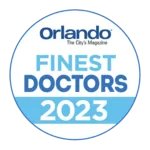In the United States, more than 62,000 new incidences of thyroid cancer will be diagnosed in 2016, resulting in just under 2,000 deaths.
Overall, thyroid cancer remains a relatively uncommon form of cancer. However, due to new technological innovations, which are able to detect the disease early on, diagnoses are on the rise. This early detection capacity ultimately bodes well for treatment and for increasing one’s chances for long term survival.
Dennis was recently diagnosed with thyroid cancer and was referred to Henry N. Ho, M.D., a board certified otolaryngologist, specializing in head and neck cancer, president of The Ear, Nose, Throat and Plastic Surgery Associates and co-director of the Head and Neck Program at the Florida Hospital Cancer Institute.
Dennis is now enjoying life cancer free following treatment with Dr. Ho and his team.
“I felt very comfortable with Dr. Ho and his level of expertise in the subject,” says Dennis. “He and his staff were very efficient in getting me taken care of quickly once they made the diagnosis.”
What is Thyroid Cancer?
An individual with thyroid cancer has developed a malignant tumor originating in abnormal cells in the thyroid gland. If not treated swiftly, the tumor may grow and spread to other tissues and organs throughout the body.
Located in the lower neck, the thyroid is an endocrine gland whose main function is to produce hormones that regulate body temperature, blood pressure, respiration and heart rate.
Thyroid cancer is the fifth leading type of cancer among women, and almost three out of four cases of the disease affect women.
Causes of Thyroid Cancer
The exact causes of thyroid cancer remain a mystery. As with other types of cancer, mutations in the DNA of the cells appear to play a central role.
There are certain risk factors associated with thyroid cancer, which may increase a person’s chances of developing the disease:
- Genetics: having a family history of certain genetic conditions, or having inherited an abnormal gene
- Gender: thyroid cancer affects roughly three times more women than men
- Age: roughly two out of three cases of thyroid cancer affect individuals between the age of 20 to 55
- Radiation: exposure to increased amounts of radiation increase one’s chances of contracting thyroid cancer
- Breast cancer: some studies have demonstrated that people who have survived breast cancer are more likely to develop thyroid cancer later on
Symptoms of Thyroid Cancer
Early on in the progression of thyroid cancer, the tumor remains quite small and patients may not notice any signs or symptoms of its presence.
It is only as the tumor grows in size and begins to impact nearby tissue, muscle and organs, that signs of thyroid cancer may become evident. The following symptoms are not unique to thyroid cancer, so it’s important to consult a doctor in order to obtain a proper diagnosis:
- A lump or swelling in the neck (the most frequent sign)
- Problems breathing, wheezing or swallowing
- A persistent cough or sore throat that won’t heal
- Pain in the front, lower part of the neck, and perhaps in the ears
- A hoarse voice or other vocal alterations
Some individuals may not exhibit any signs of thyroid cancer; their physician may discover a bulge in their neck during a regular physical examination.
How is Thyroid Cancer Treated?
In the treatment of thyroid cancer, an otolaryngologist specializing in head and neck surgery, will be able to assemble the optimal team of specialists needed to contribute to a patient’s treatment program. This may include referrals to an endocrinologist, and a radiation or medical oncologist. The exact treatment regimen will depend on an individual’s age, the stage of the cancer, medical history and one’s personal preferences.
“After I came in, Dr. Ho took a look at my situation, and surgery was necessary to remove my thyroid,” says Dennis.
Surgery is usually the first avenue used to treat thyroid cancer. All or part of the thyroid gland will be removed.
Some patients require radioactive iodine treatment after surgery, to eliminate any residual thyroid tissue. Other complementary treatments may include:
- Thyroid hormone therapy
- Chemotherapy
- External beam radiation therapy
- Targeted drug therapy
If all of the thyroid gland has been removed, patients are prescribed thyroid hormone medication for life.
For Dennis, being in the trusted hands of Dr. Ho and his staff, was a source of reassurance and comfort.
“Dr. Ho’s bedside manner was very pleasant and he was very friendly every time I talked to him,” says Dennis. “The staff here were very pleasant to work with. Everybody knew their roles and were very efficient in getting me scheduled for the surgery, and also additional referrals to the endocrinologist.”
Recovery from Thyroid Cancer Surgery
After treatment, your doctor will want to monitor your progress closely, and may administer blood tests or ultrasounds. Follow up exams by one’s physician are crucial in making sure the cancer doesn’t come back, and if it does reoccur, to catch it in time.
“We had surgery about six weeks ago. I was just in for a follow up with Dr. Ho and everything looks good, and I don’t have to see him, hopefully, again,” Dennis says with a laugh.
In general, most patients are successful with thyroid cancer treatment, as the disease is usually detected early on, but follow-up visits will be required over the long term. Some thyroid cancers can recur even ten or even twenty years following the original treatment.
According to the American Society of Clinical Oncology, the five-year survival rate for 90 percent of thyroid cancer patients is greater than 80 percent.
After a successful thyroid cancer surgery, Dennis is grateful to Dr. Ho and his entire staff for their diligent and exceptional work.
“I would highly recommend Dr. Ho and the whole staff here,” he says. “They were very pleasant to work with and did a great job with my case.”

